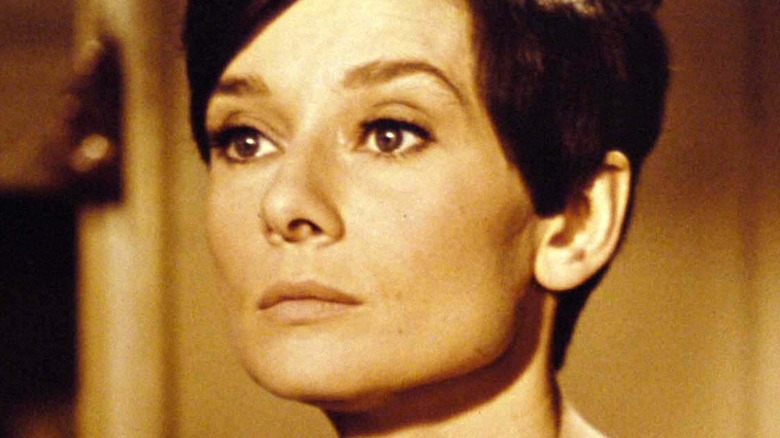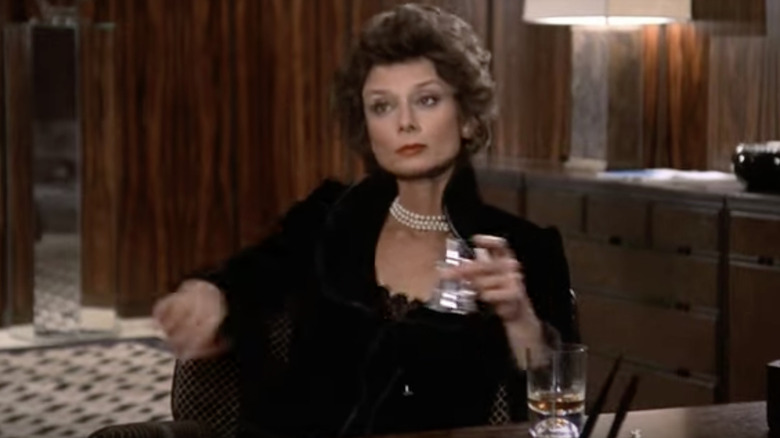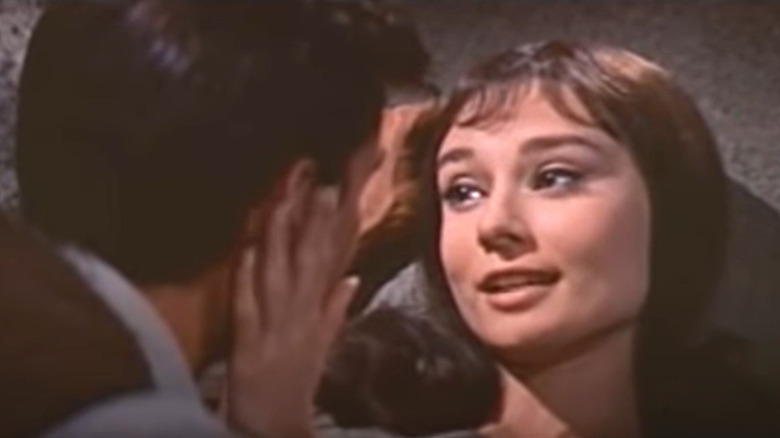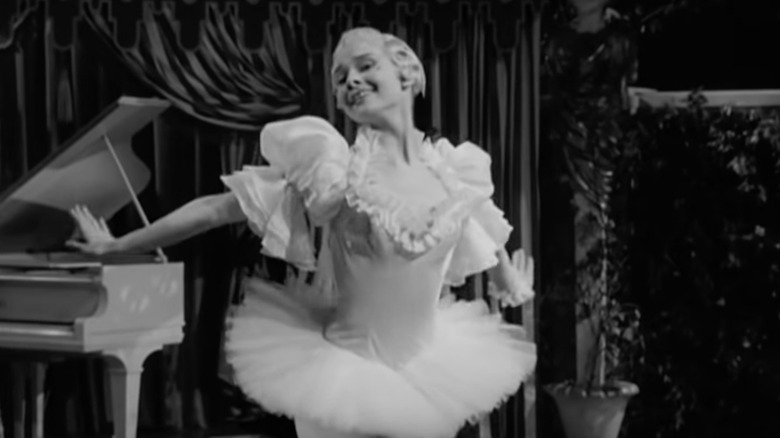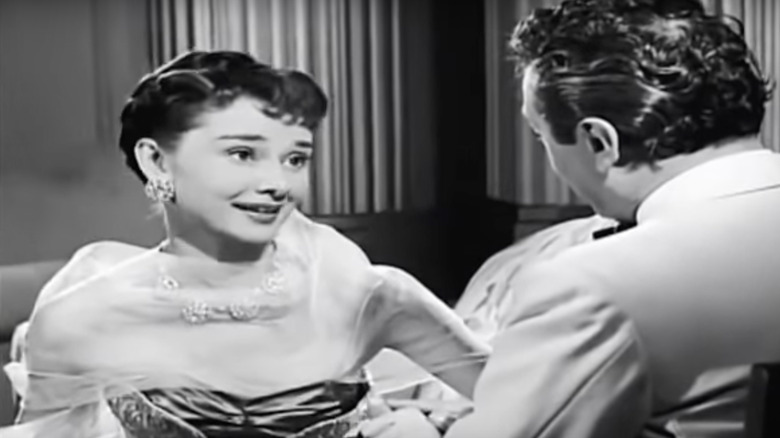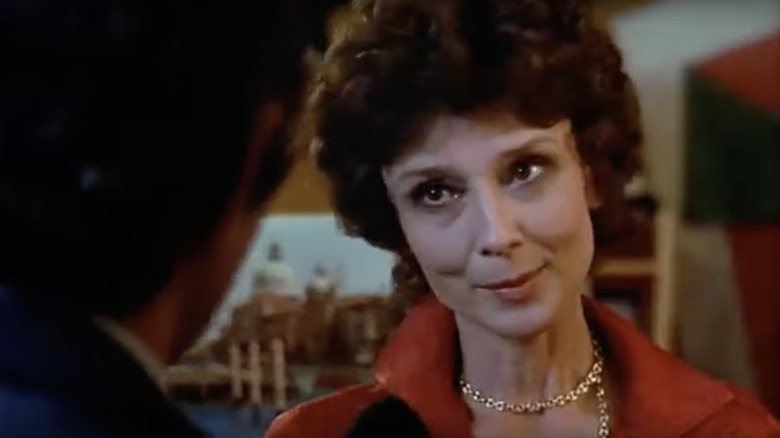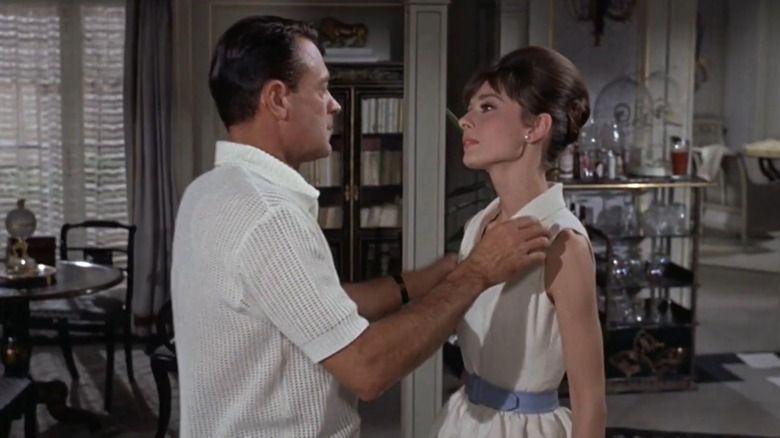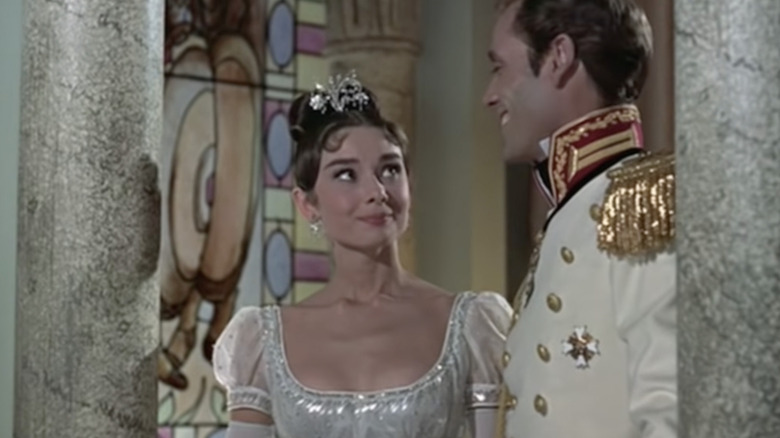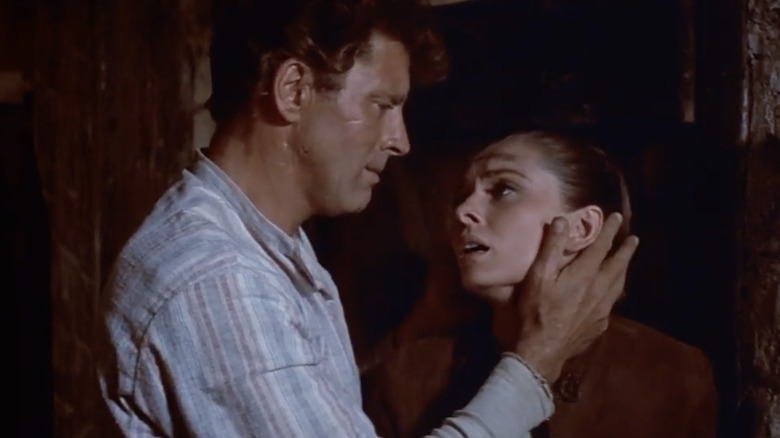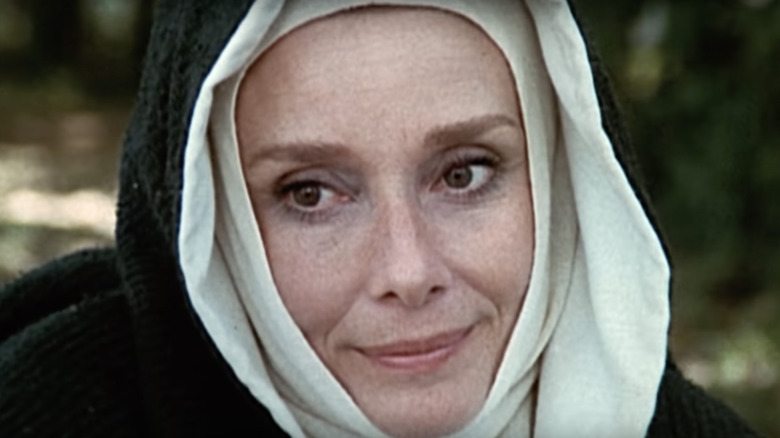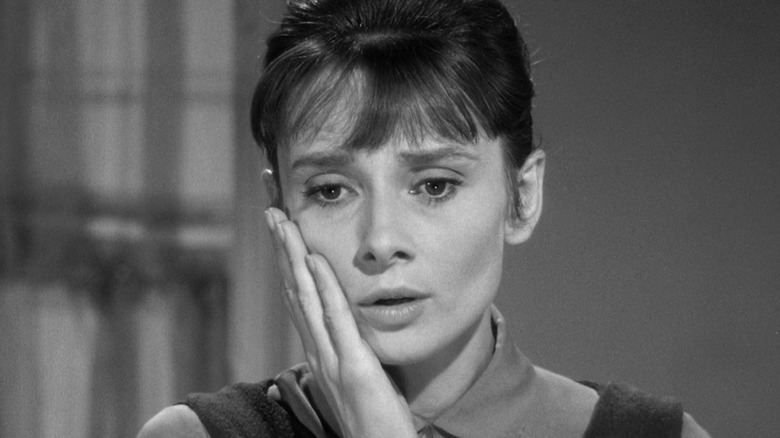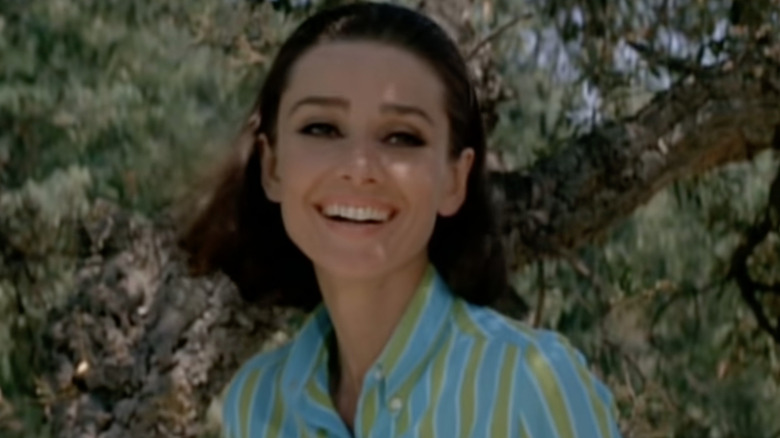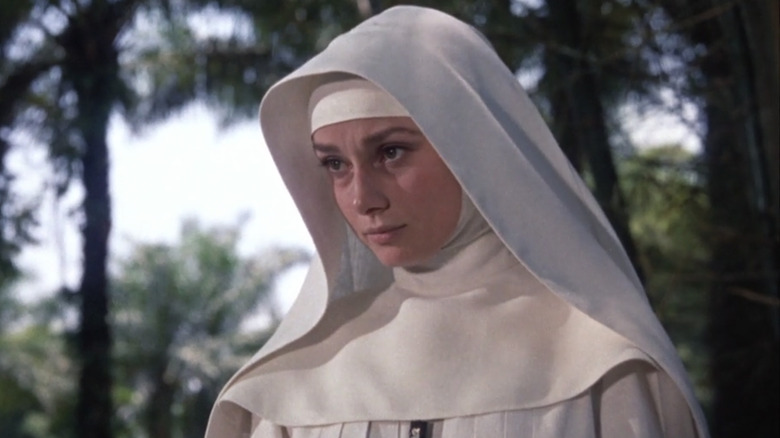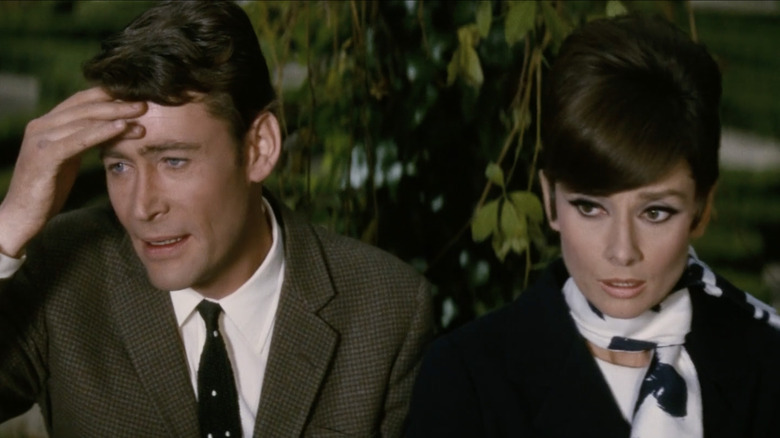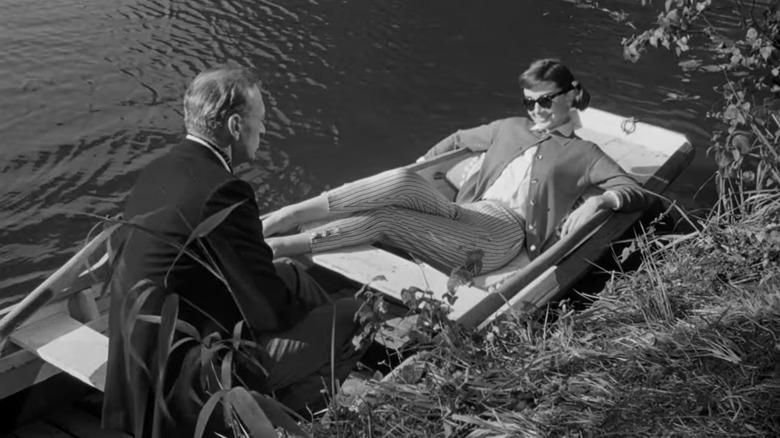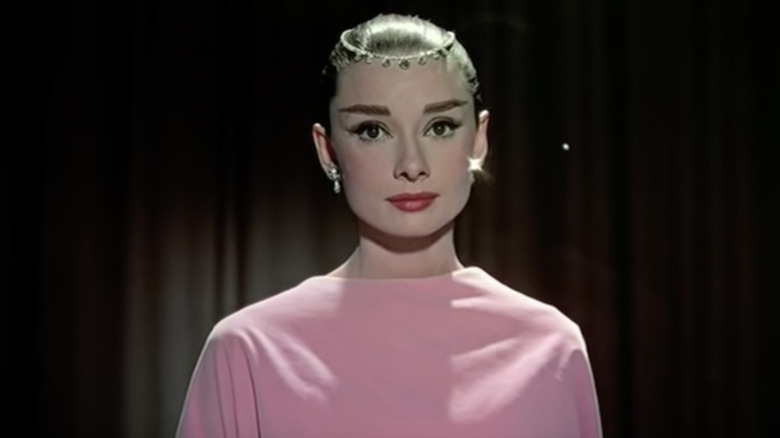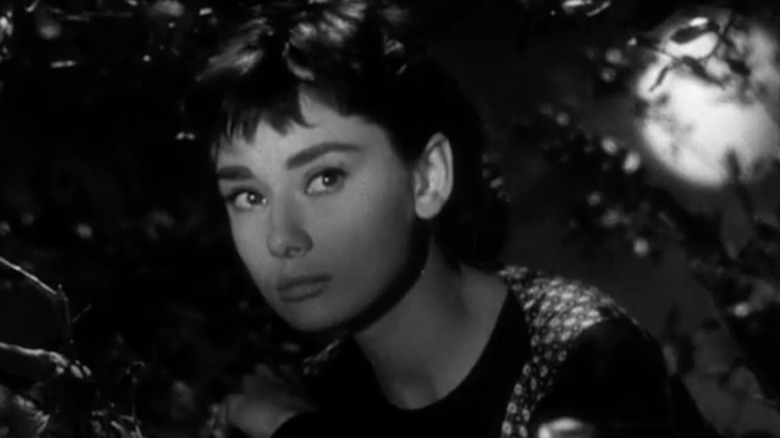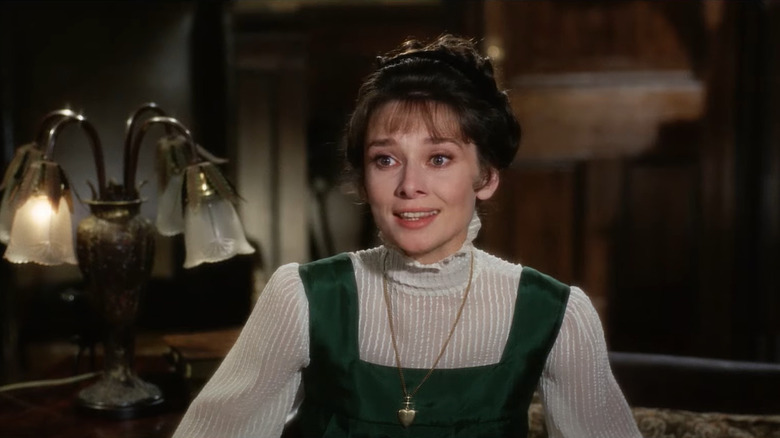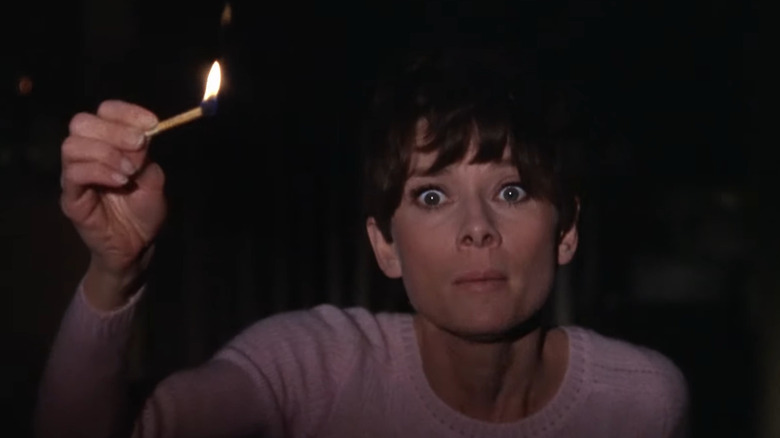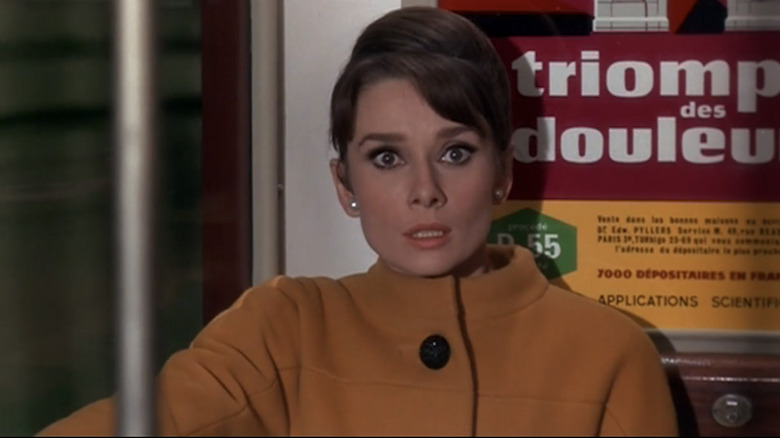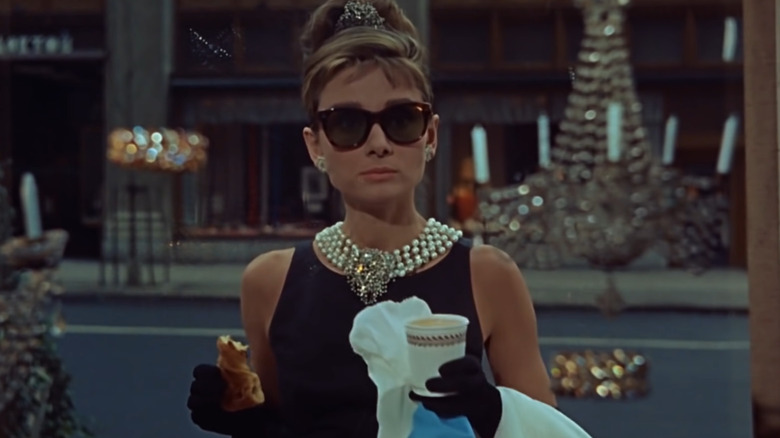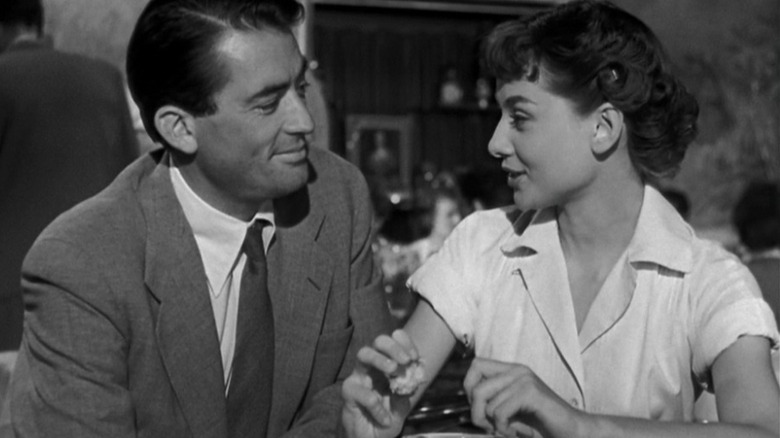Every Audrey Hepburn Movie Ranked Worst To Best
Few stars have ever burned as brightly as Audrey Hepburn. Turner Classic Movies called her "Hollywood's storybook princess" and "a paradigm of sparkling charisma and class." In her best films, she's absolutely radiant — not disappearing into a role so much as providing it with a kind of knockout, super-charged presence, making her character of the moment both deeply lovable and instantly memorable. She had a special gift for embodying glamor, innocence, and joy, and she had one of the most memorable faces in Hollywood history.
There are very few outright duds in her filmography. Almost everything here is at least interesting, and many of the movies are stone-cold classics of their genres. Hepburn did immortal work in everything from romantic comedies to thrillers to musicals. Really, our only problem with her career is that it was all too short — but her early retirement helped ensure her stellar reputation and avoid any pronounced late-in-life slump. She always knew how to leave her audience wanting more. With that in mind, join us as we take a look at her impressive catalogue, ranking her movies from worst to best. (FYI, we're intentionally leaving off Steven Spielberg's "Always," as her appearance there is basically a highly billed cameo.)
21. Bloodline
Dull and ponderous, "Bloodline" aims for dark sensationalism and hits ... nothing in particular. This is a scattershot film that gets jumbled up in its own plot and never succeeds in making the audience care.
Audrey Hepburn is misused in the lead role as Elizabeth Roffe, who, upon her father's death, inherits the lion's share of stock in his extremely lucrative company. It turns out that her father's fatal "climbing accident" was actually murder, a deliberate power-grab by someone in their corporation. As long as Elizabeth holds off on taking the company public, she's standing in the way of the killer making a fortune, and that makes her a target. The film meanders through various attempts on her life — all tangentially connected to a sordid series of snuff films — until it finally slumps, exhausted, to its conclusion.
What's worse, for a Hepburn fan, is that even her presence has no flair. Slant's Dan Callahan is cutting but not unfair in his assessment, noting her "low energy" and calling the film a "desecration" of Hepburn's image: "Even her most devoted collaborator, the clothes designer Givenchy, lets her down; there isn't a single dress that sets her off to advantage." Hepburn is usually so inimitably stylish that there's something particularly horrible about a film where not even the fashion is on her side. It's a symptom of how joyless the movie is as a whole.
20. Green Mansions
Even upon its release in 1959, "Green Mansions" was a mediocre romantic adventure film, and time has only highlighted its flaws. It's unlikely that anyone will ever champion this as a lost Audrey Hepburn classic.
Hepburn stars as Rima, the otherworldly "bird woman" who lives in the jungle. With her bravery, sprightly sweetness, and entourage of adorable pet deer, she's practically a Disney princess — which is usually the kind of role Hepburn could embody to perfection. Apparently, however, she's a little less adept at "Disney princess crossed with Tarzan." It doesn't help that she, like her co-stars Henry Silva and Sessue Hayakawa, is playing a role in a culture she has no connection to. The casting is only part of the underlying racism of "Green Mansions," and it's hard to watch some of these tribal scenes without cringing.
On top of all that, Hepburn's chemistry with Anthony Perkins amounts to little more than a damp fizzling-out. "Green Mansions" isn't the only Hepburn movie to be marred by the racism of its era, but it's the only one to not offer any real redeeming qualities, let alone any superb ones. The cinematography is solid, and the jungle looks good. That's about all we can say in the movie's favor.
19. Secret People
1952's "Secret People" is one of Audrey Hepburn's earliest substantial film roles. She plays Nora, the younger sister of the movie's heroine, Maria Brentano.
This suspenseful drama offers an unconventional take on an assassination plot. Maria and Nora's home country is still ruled by the same dictator whose regime led to their father's execution. The sisters have spent years as refugees, trying to live quiet, ordinary lives. Maria's unexpected reunion with lost love Louis — now a revolutionary — quickly engulfs her in a political firestorm. She reluctantly assists him with his plot to kill the dictator, but she's unprepared for the collateral damage the plan metes out. No longer comfortable with Louis' ruthlessness and moral ambiguity, she has some important choices to make.
"Secret History" is somewhat slight — British cinema had made better politically infused dramas before, and it would make better ones later. These days, the movie is mostly worth watching for the chance to see Hepburn practice her original vocation: ballet. Per Financial Times, Hepburn's early dance aspirations were derailed by her interrupted training — due to World War II — but Nora's ballet gives us a glimpse of the Audrey Hepburn who might have been.
18. Monte Carlo Baby
1951's "Monte Carlo Baby" plays an unusual role in Audrey Hepburn's pre-breakout career. The film wasn't significant enough to attract a lot of attention, but it provided her with another kind of opportunity. According to Hollywood historian Robert Matzen, Hepburn was filming "Monte Carlo Baby" when she ran into the famous author Colette, who soon wanted her for the Broadway production of her play "Gigi." Their meeting — and Hepburn's attendant and rapid elevation to stardom — became a major part of Hepburn's legend.
So that background serves as a reason to pick up "Monte Carlo Baby," but if you're not interested in plumbing the depths of Hepburn lore, you're fine missing this one. It's a lighthearted farce about the wrong baby being passed around the Monte Carlo entertainment scene like a hot potato. There are a few laughs, the glamorous settings are a plus, and the movie's doubled production in French and English (per TCM) is an interesting behind-the-scenes tidbit, but it's all more fluff than substance.
17. They All Laughed
"They All Laughed" is a dangerous thing to call your movie because what if the audience doesn't laugh? If the people on the screen are having more fun than the people in the theater, you don't want to rub it in.
In this case, reports of laughter vary wildly. This is one of the most love-it-or-hate-it films in Audrey Hepburn's repertoire. Variety enjoyed it as a hangout film, with its review saying, "Rarely does a film come along featuring such an extensive array of attractive characters with whom it is simply a pleasure to spend two hours." Vincent Canby over at The New York Times, meanwhile, went directly for the throat, writing, "Any way you look at it — as a comedy, as moviemaking, as a financial investment, 'They All Laughed' is an immodest disaster. It's aggressive in its ineptitude." Low-key, aimless, bittersweet comedies are often divisive, and maybe the best predictor of your opinion of "They All Laughed" is whether or not that description sounds appealing or appalling.
The film's loose plot involves private eyes becoming entangled with the women they're assigned to tail, making a kind of cat's cradle of affairs, infatuations, voyeuristic pleasures, and manipulations, all of which are captured with gentle affection. It's a wry, impressionistic look at love in New York in 1981, a specific taste that's not going to be to everyone's liking — but there's still plenty here to reward interested viewers.
16. Paris When It Sizzles
"Paris When It Sizzles" looks at a screenwriter's last-minute attempt to churn out the script he's promised (and been paid for) over two frantic days. Luckily, he receives inspiration in the form of a gorgeous temporary secretary. With William Holden as the screenwriter and Audrey Hepburn as the secretary, "Paris When It Sizzles" is guaranteed to provide a certain baseline level of entertainment. The two have proven charm and chemistry. However, the movie never really rises above the sparkle its stars naturally provide.
Hollywood has always enjoyed poking fun at itself, and there are some stellar examples of this kind of moviemaking satire here. When the comedy doesn't work, though, what you're left with is thin, overly self-referential material that doesn't have much value outside of the in-jokes. "Paris When It Sizzles" is definitely far from the worst example of this kind of thing, but it could still do with a little more meat on its bones. It's light fare — inoffensive but instantly forgettable. Variety noted that the film gives you the perfect words to criticize it when Holden's character deems his work "contrived, utterly preposterous and totally unmotivated."
15. War and Peace
It's 1805, and the Russian aristocracy is abuzz about Napoleon. The next few years will test all the characters in "War and Peace" as they contend with history-defining action on the battlefield and life-changing romances off it. The emotional center of the film is the relationship between Audrey Hepburn's Natasha — young, sweet, and impetuous — and two of her potential suitors, friends Pierre (Henry Fonda) and Andrei (Mel Ferrer).
Ideally, the epic and the intimate intertwine and support each other, but "War and Peace" sometimes stumbles on that point. The New York Times described it as "a vast Technicolored panorama of human drama and military spectacle" but with "characters [who] seem second-rate people, hackneyed, and without much depth ... giving off little more personal vibrance than the nameless soldiers in the massive scenes of war." In short, the performances are too swamped in the extravaganza to have enough room to breathe, and that results in a film that is impressive without being all that memorable.
14. The Unforgiven
If all you had to go on was a list of the people involved, you might guess that "The Unforgiven" is some lost classic of the Western genre. Directed by the legendary John Huston — who brought us such films as "The African Queen" and "The Maltese Falcon" — and starring not only Audrey Hepburn but also luminaries like Burt Lancaster and Audie Murphy, the movie seems to have all the right elements. Unfortunately, they mostly fail to gel. And while the film makes an earnest attempt to engage with anti-Native prejudices in the Old West, it's hard to watch it without coming away with the impression that it's only saying Indigenous people shouldn't face persecution if they essentially identify as white.
Hepburn plays Rachel, the adopted daughter of the Zachary clan. The family has been dogged for years by the unrelenting Abe Kelsey, who claims that Rachel is really a Kiowa and that her tribe avenged the Zacharys' abduction of her by taking his son. While the Zacharys deal with the racism this story stirs up in their neighbors, they also contend with Lost Bird (Carlos Rivas), who has come to retrieve his long-missing sister.
Under better circumstances, this could come together into a tense and high-stakes drama with no easy answer for how to deal with the sins of the past, and its leads — who turn in strong performances — would have been up for the task. Regrettably, the resolution is so weak and one-sided that it mars everything else.
13. Robin and Marian
"Robin and Marian" offers an unconventional and poignant slant on the Robin Hood story. Sean Connery's aging Robin Hood has an inherent pathos to him: He's a man who's lived long enough to see himself become a legend but who's well-aware of how frequently the truth behind that legend is disquieting and dispiriting. Similarly, Maid Marian is now an abbess — Mother Jennet — who's lived many bittersweet years in a kind of solo epilogue to their famous story. Their reunion is prickly, tender, and, as ever, swamped in complications regarding the ongoing struggles with King John and the Sheriff of Nottingham. The more things change, the more they stay the same, but the people get older and more melancholy.
Roger Ebert noted that the movie, while uneven, is grounded by its two key performances: "Connery and Hepburn seem to have arrived at a tacit understanding between themselves about their characters. They glow. They really do seem in love. And they project as marvelously complex, fond, tender people; the passage of 20 years has given them grace and wisdom." This is ultimately a more realistic and human look at classic lore, and Connery and Hepburn's quiet strength makes us view them, appropriately, with more tenderness than awe. They've been heroes, and "Robin and Marian" makes them into people.
12. The Children's Hour
The tragic aspects of "The Children's Hour" may frustrate viewers now — it's all too common for LGBTQ+ stories to end in death — but it was an important film on its release in 1961. As IndieWire notes, director William Wyler had actually adapted the story before, in a movie called "These Three," but the restrictions of the Hays Production Code meant the plot had to be overhauled to avoid any reference to queer themes. With this new version, he got a second chance to do it right — or at least as right as possible, under the circumstances.
Audrey Hepburn and Shirley MacLaine star as Karen Wright and Martha Dobie, respectively, old friends who've opened up a boarding school for girls. They're just starting to finally turn a profit too. Then a petulant schoolgirl, seeking to get out of trouble, tells her grandmother that she knows an "unnatural" secret about her teachers. The rumor quickly ruins Karen and Martha's lives, even taking a toll on Karen's stalwart fiancé, Joe. While they're struggling to figure out how to rebuild their lives after this nationally publicized catastrophe, Martha is putting together some pieces of herself that have never made sense before. "I have loved you the way they said," she tells Karen.
The sad, tense drama of "The Children's Hour" makes it hard to watch, but MacLaine and Hepburn turn in such nuanced, human performances that it's also impossible to look away.
11. Two for the Road
Jazzy and nuanced, "Two for the Road" takes a winding journey through a marriage, using a couple's literal winding journeys as windows into their lives. Albert Finney and Audrey Hepburn play Mark and Jo Wallace, whose scenic European drives and personal glamor can't hide the unhappiness curdling just beneath the surface of their lives. This latest trip offers them the chance to take stock of the past, of each other, and of themselves, and we go along for the ride.
Any relationship movie hinges on the performances of its leads, and Finney and Hepburn are, unsurprisingly, both impressive and utterly convincing. They completely sell the couple's changing rapport, from their first meeting to their most troubled stretches.
The film — like Richard Linklater's "Before" trilogy, which it seems to prefigure — manages a deft blend of style and naturalism, satisfying our desire for romance while also scratching our itch for less sentimental realism. We might not be able to picture ourselves in "Casablanca," but the foibles, pleasures, and difficulties of "Two for the Road" are all a little closer to home. As Roger Ebert put it, the movie is both "a Hollywood-style romance between beautiful people and an honest story about recognizable human beings."
10. The Nun's Story
This sensitively crafted film casts Audrey Hepburn as Sister Luke — formerly Gaby Van Der Mal — a nun whose sincerity, skill, and dedication (especially to her chosen specialty of tropical medicine) are counterbalanced by a persistent struggle with the vow of obedience. "The Nun's Story" follows Sister Luke through her training and multiple assignments, culminating in her decision to leave the order during World War II.
While other Hepburn movies may have left more of a cultural mark, "The Nun's Story" is still one of the major jewels of her filmography. It was very acclaimed on its release, garnering eight Academy Award nominations, including Best Picture, Best Director, and Best Actress in a Leading Role. Variety called it "a soaring and luminous film" and believed it was Hepburn's "most demanding film role" and her "her finest performance," which is no mean praise. It's also a relatively rare chance to get to see her do straight dramatic work, and she proves that she's more than up for the task. Her portrayal of Sister Luke is nuanced, complex, vivid, and unforgettable.
9. How to Steal a Million
"How to Steal a Million" is good frothy fun that's sure to satisfy caper film fans. There are crimes within crimes and lies within lies here, but it's all handled with a light touch. The film's complications aren't mindbenders, they're delicious layers of sponge cake.
Audrey Hepburn is Nicole, the daughter of master art forger Charles Bonnet (Hugh Griffith). Her family's long history of forgery and fraud keeps her on edge, but so far, her father has always stayed one step ahead of trouble. That changes when he loans a fake Renaissance sculpture to a museum and accidentally sets it up for exactly the kind of forensic analysis he's always tried to avoid. The insurance company needs to verify the piece's worth, and that's the last thing Charles wants them to find out. So Nicole recruits Simon (Peter O'Toole), whom she believes to be an art thief. If he can yank her father's Venus sculpture from the museum before the insurance evaluation, he'll save them. But Simon isn't exactly who Nicole thinks he is ....
The film keeps everything funny, clever, and lively. New York Times reviewer Bosley Crowther called it "a delightful lot of flummery while it is going on ... a parody so deft and delicious it might be an original." The Hepburn-O'Toole romance provides a nice cherry on top, adding to Hepburn's repertoire of great on-screen flirtations.
8. Love in the Afternoon
"Love in the Afternoon" takes a high-concept premise that could easily be silly and makes it into a sweet, poignant romantic comedy. Bright-eyed young Ariane (Audrey Hepburn) is the inexperienced daughter of a jaded private eye, and there's nothing she loves more than reading through his files — the more scandalous and salacious, the better. This hobby puts her on a collision course with Frank Flannagan (Gary Cooper), a man whose annual visits to Paris always involve seducing other men's wives.
Ariane saves Flannagan's life — the sequence is so delightful that we won't spoil it here — and the two of them enter into a curious romantic affair where she deliberately stays an enigma to him. She believes a girl like her couldn't really hold his attention very long, so she equips herself with a fictional life even more eyebrow-raising than Flannagan's. They're just two jaded sophisticates who know where they stand with each other, supposedly, and she always leaves before Flannagan's real date for the night comes over. Of course, the lies have to fall apart eventually.
Bosley Crowther ruled that director Billy Wilder "employs a distinctive style of subtle sophisticated slapstick to give the fizz to his brand of champagne" and that the performances "archly, cryptically, beautifully" sell the action. Indeed, it's a sublimely cast movie, right down to the smallest supporting characters. Hepburn makes a wonderful center, but everyone here is worth watching.
7. Funny Face
Lively and beautiful to look at, "Funny Face" is a musical that's as light as air. Audrey Hepburn plays Jo Stockton, a brainy and self-serious bookshop employee who is — much to her initial horror — recruited to be a cutting-edge fashion model. For her, it's just a way to get to Paris, where she can get a front-row seat to the lectures of the illustrious Professor Flostre. Along the way, though, Jo falls head over heels in love with a fashion photographer played by Fred Astaire. She may even wind up choosing him over philosophy.
Hepburn and Astaire are effortlessly bewitching, but they are, admittedly, upstaged by the production itself. The Independent called the film "a triumph of form over content," with its "flimsy and whimsical in the extreme" story supplanted by "the eye-popping color, the self-reflexive photography and visual effects, the dance sequences ... and the witty and ingenious use of the Paris locations." That seems appropriate for a fashion-centric movie, honestly, so we're fine with kicking back and enjoying the style and beauty of the world "Funny Face" presents us with. It may be insubstantial, but it's still delightful.
6. Sabrina
Billy Wilder's effervescent "Sabrina" stars Audrey Hepburn alongside Humphrey Bogart and William Holden. Hepburn plays the title character, whose father is the chauffeur for the urbanely wealthy Larrabee family. She's head-over-heels in puppy love with younger son David Larrabee (Holden), and seeing him go through affair after casual affair breaks her heart, which leads her to a pretty dark spot. Granted, this is an unusual start to a romantic comedy, but stay with us — like Hepburn's character, "Sabrina" is bound for happier places.
A few years in Paris revitalize Sabrina. When she finally comes back home, her new glamor and confidence give her an allure that David can't resist ... even though the family needs his impending marriage to expand their empire. Responsible Linus (Bogart), David's older brother, needs to break up this new romance as soon as possible — and the best way to do that is to take Sabrina out on a few dates himself and hope he can turn her head. Unsurprisingly, he does, but he turns his own in the process.
Sparkling chemistry, realistic and measured darkness, a sharp script, and plenty of star power make "Sabrina" a lasting classic. The film garnered multiple Oscar nominations, including Best Director and Best Actress in a Leading Role, and it snagged a spot on the American Film Institute's list of "The 100 Greatest Love Stories of All Time." It even succeeds in making "Linus" a plausible name for a romantic hero, something few movies have attempted, and we're sure Linuses everywhere are thankful for it.
5. My Fair Lady
"My Fair Lady" stands as one of our favorite musicals, with charismatic stars and catchy songs. The irascible and arrogant Professor Henry Higgins (Rex Harrison) takes on a personal challenge: He's going to take Eliza Doolittle (Audrey Hepburn), a Cockney girl who works as a flower seller, and change her accent until she can pass for an aristocrat. Early 20th-century England is bound by class, and accent is one of the biggest markers that signifies where someone "fits in," so Higgins changing Eliza's voice can change her life. The problem is, he doesn't really think about the effect that will have on her — or the effect she'll have on him.
Hepburn's singing was mostly dubbed by Marni Nixon, and Roger Ebert records that this sometimes led to people dismissing the star's performance — wrongfully, in his opinion. "That Hepburn did not do her own singing obscures her triumph," Ebert said, "which is that she did her own acting. 'My Fair Lady' [is] trickier and more challenging than most other stage musicals; the dialogue ... [requires] Eliza to master a transition from Cockney to the Queen's English. All of this Hepburn does flawlessly and with heedless confidence, in a performance that contains great passion." She may not stand out quite as much as Rex Harrison, who is undoubtedly at his best here, but she's still remarkable and a big part of why the movie works so well.
4. Wait Until Dark
"Wait Until Dark" is a tense, well-crafted suspense thriller. Audrey Hepburn stars as Susy Hendrix, who's still adjusting to the loss of her sight. She then finds herself caught in the middle of a crime that has nothing to do with her. Her husband unknowingly acquired a doll stuffed full of heroin, and now three men are determined to get it back. The most menacing of the trio — Alan Arkin's chilling Harry Roat — is terrifyingly clever and will stop at nothing. Susy will have to outwit all three of them and level the playing field in order to survive.
David Nusair at Reel Film Reviews said, "The picture's growing emphasis on the protagonist and villains' cat-and-mouse exploits cultivates an atmosphere that's eventually unbearably tense –- with the final half hour boasting a white-knuckle, edge-of-your-seat feel that's nothing short of astonishing in its effectiveness. The end result is a fairly timeless thriller that still ranks as one of the very best examples of the genre." It's truly hard to sit through that spectacular nail-biter of a third act without feeling Susy's anxiety like it's your own, and once you've gotten through it, you'll never think about a refrigerator light the same way again.
Hepburn provides the perfect mixture of strength and vulnerability for an imperiled thriller heroine, and her performance here is enough to make us wish she'd done more suspense. As it is, though, she still left us with one of the genre's most memorable leads.
3. Charade
Near the climax of the twisting and turning "Charade," Audrey Hepburn's Reggie Lampert cries out with tearful frustration, "Oh, I don't know who anybody is!" It's an exclamation that captures the blend of comedy and tension that the film handles so well.
Reggie Lampert has just decided to divorce her husband, but when he preempts the paperwork by getting murdered, she finds herself more embroiled in his life than ever. It turns out that in World War II, he and several other men banded together to steal a large sum of money earmarked for the French Resistance ... only her husband betrayed the rest of his partners and walked away with all of it. Now they've found him, and they want their share. They're willing to kill her to get it too. Orbiting around her, a possible source of help or harm — and certainly a great source of romance — is Cary Grant's affable Peter Joshua. Well, that's the first name he's introduced with anyway.
It can be hard to juggle laughs and suspense, but "Charade" does it with aplomb. Come in at the scene where Grant playfully showers with his clothes on as a kind of sexual tease, and you'll know you're watching a romantic comedy. Come in during the terrifying interlude when James Coburn's Tex interrogates Reggie by dropping match after lit match on her, and you'll immediately be on edge. Nothing is simple here, not even the genre, but all of it is fun.
2. Breakfast at Tiffany's
"Breakfast at Tiffany's" has such insouciant charm that it's easy to forget how bittersweet and compromised it is just below the surface. It mirrors its heroine, who's a master of trying to smile through tears. Audrey Hepburn is at her best as Holly Golightly, a young woman who's reinvented herself as a broke but chic New Yorker who lives off a series of wealthy men. Holly wants a glamorous life and a secure future, but her present is full of bad dates, disappointments, and broken connections.
As much as Holly tries to lean into the carefree, free-spirited side of her life, her new neighbor, Paul (George Peppard), sees through to her wounded heart — mostly because he's in much the same position. He's a writer, but he's letting his typewriter gather dust while he lives off an affair with a married woman. The only other option is to confront the dreaded second book, where he might not live up to his potential. For all their seeming risk-taking, both Paul and Holly try to keep their hearts safe from any real endangerment ... which, of course, means they inevitably fall in love.
The film has plenty of style — it contains some of Hepburn's most iconic looks — and color. It's almost irresistibly fun to watch, and its darker, more complex underpinnings give it a lingering power. The only real flaw is unfortunately a glaring one: Mickey Rooney cast in yellowface to play a racist Japanese caricature whose "comedy" is like nails on a chalkboard.
1. Roman Holiday
The sweet and delightful "Roman Holiday" casts Audrey Hepburn as a princess, and it immediately feels like the role she was born to play. Princess Ann is caught in a life of endless public appearances, all of them calibrated towards expressing the perfect courtesy and solemnity. It's exhausting — and at the end of it all, she doesn't even get to choose how to fall into bed. She wants pajamas, and she gets an antique-looking nightgown. Frustrated to the point of collapse, Ann makes a temporary break for the streets of Rome and a glimpse of an ordinary life.
She falls in with Joe (Gregory Peck), a perpetually broke journalist who soon identifies her scandalous secret day out as the biggest story of his life. Concealing his identity from Ann — or Anya, as she's calling herself to avoid detection — he shepherds her around Rome, helping her create her perfect day. But what starts as opportunism quickly turns into love.
"Roman Holiday" does a wonderful job capturing Ann's genuine joy at the freshly revealed world around her, and its leads are both dazzling. This fizzy, gently bittersweet romantic comedy provided Hepburn with her breakout role, and it helped establish the on-screen brand that would make her one of Hollywood's most unforgettable stars.
